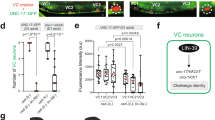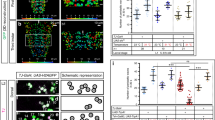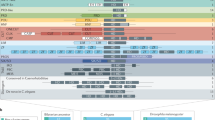Abstract
THE Caenorhabditis elegans gene unc-30 is required for the develop-ment and functioning of the 19 inhibitory GABAergic (γ-aminobutyric-acid-secreting) type D motor neurons, which control locomotion1–4. In unc-30 mutants the D neurons lack GAB A2 and have defects in axonal pathfinding and synaptic connections (J. White, personal communication). We report here that unc-30 encodes a homeodomain protein that is present in the nuclei of the D neurons at high levels in young larvae, in which the motor cir-cuitry is formed, and at low levels in older animals. The UNC-30 protein is also present in six non-G A B Aergic neurons and is absent from the seven non-D-type GABAergic neurons. Ectopic expres-sion of unc-30 induced GABA expression in cells that are normally not GABAergic. We propose that unc-30 functions as a transcrip-tional regulator within the type D neurons to control their terminal differentiation and that unc-30 is sufficient in some but not all cell types to induce GABA expression.
This is a preview of subscription content, access via your institution
Access options
Subscribe to this journal
Receive 51 print issues and online access
$199.00 per year
only $3.90 per issue
Buy this article
- Purchase on Springer Link
- Instant access to full article PDF
Prices may be subject to local taxes which are calculated during checkout
Similar content being viewed by others
Author information
Authors and Affiliations
Rights and permissions
About this article
Cite this article
Jin, Y., Hoskins, R. & Horvitz, H. Control of type-D GABAergic neuron differentiation by C. elegans UNC-30 homeodomain protein. Nature 372, 780–783 (1994). https://doi.org/10.1038/372780a0
Received:
Accepted:
Issue Date:
DOI: https://doi.org/10.1038/372780a0
This article is cited by
-
Homeobox genes and the specification of neuronal identity
Nature Reviews Neuroscience (2021)
-
Unique homeobox codes delineate all the neuron classes of C. elegans
Nature (2020)
-
Systematic evaluation of C. elegans lincRNAs with CRISPR knockout mutants
Genome Biology (2019)
-
Role of tyramine in calcium dynamics of GABAergic neurons and escape behavior in Caenorhabditis elegans
Zoological Letters (2018)
-
Inversion in the worm
Nature (2015)
Comments
By submitting a comment you agree to abide by our Terms and Community Guidelines. If you find something abusive or that does not comply with our terms or guidelines please flag it as inappropriate.



